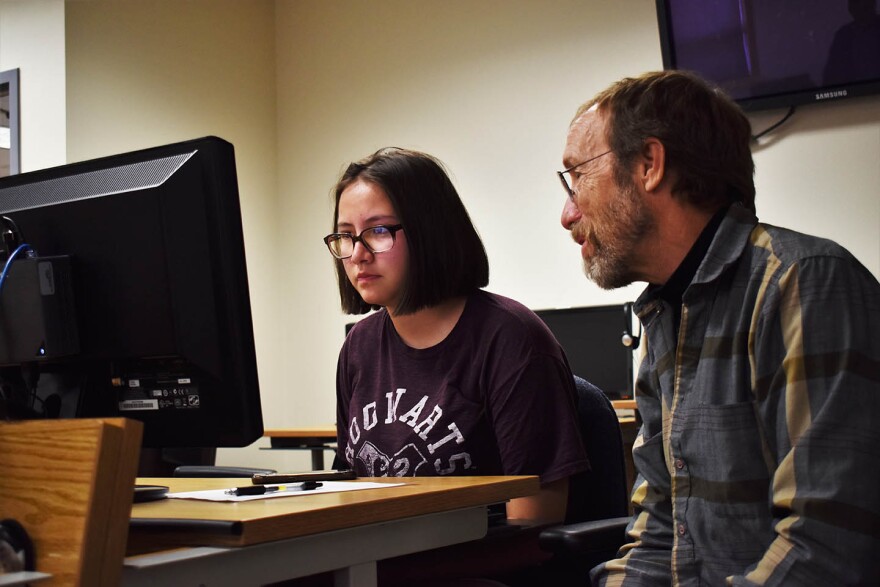On the bank of Spring Creek in Ronan, a half-dozen teenagers eye the water dubiously as camp counselors fit them with hip-high waders.
This is Native Tech Camp, which gives young tribal members a week of exposure to fields of work they might not otherwise see on the reservation. The free week-long camp is open to all middle and high school students from any tribe. It’s taught by professors at Salish Kootenai College and experts in coding, game design, cyber security, data analytics and other occupations that use technology in unexpected ways.
This year’s camp theme is 'Water Is Life'. Deb Fassnacht with the Watershed Education Network lays out their plan of attack to measure Spring Creek.
"In each of the places you're going to visit this morning in our learning stations, we'll be talking about, what about that tells us it's clean and healthy, and what kind of measurement would tell us it’s not so healthy?"

Campers spend the day sampling Spring Creek for bugs, snails and shrimp and measuring the stream’s pH, temperature and nutrients with a water quality specialist from the Tribes.
The next day, the campers are in the classroom learning a coding language that lets them draw boxes, stars and loops.
Instructor Thomas Trickel gives quick one-on-one lessons in a computer lab at the Salish Kootenai College campus in Pablo. Half the kids are tuned in, calculating degrees and distance. The other half are cutting and pasting code for mesmerizing elaborate, colorful designs.
It’s more self-directed play than school, but 16-year-old Amber Redneck is diligently keeping up with the directions on the projector.
"I was trying to draw that square in a square in another square, and it's not connected, but I, I've only gotten that."
She hits enter, and the stylus draws a series of unconnected little boxes that march off the screen to the right.
"I've just gotta play around," she says.
Redneck grew up in Lame Deer on the Northern Cheyenne Reservation. She’s Northern Cheyenne and Blackfeet. She says this camp is a true eye-opener to the type of work that’s out there.
"I really like coding," Redneck says. "And yesterday, when we went to the river, I liked the chemistry part of it. I enjoyed that too."

She says growing up, her grandmother and sister were her only family members who held steady jobs. They’re both social workers.
It's hard to imagine a career when you can't really see it in right in front of you.
"Especially when everybody around you is unemployed. Unemployment is really high in Lame Deer," Redneck says.
The state pegs unemployment on the Northern Cheyenne Reservation at 10.5 percent, but other estimates are much higher.
"On the Northern Cheyenne Reservation, I think that the people are being held back from opportunities like this, especially. I don't think they've advanced much in technology. But that’s just from what I’ve observed from my living there."
Access to computers and broadband internet can be a hurdle for students in rural parts of the state. Redneck says there aren’t computer science classes at Willard High School in Missoula, where she’s a student. But she does have a computer at home.
"I'll keep practicing at this and see where I can take it."
She types in another string of code and hits enter. That one made a bunch of squares in a circle, and they all have a little tail.
"When I first looked at the examples and stuff, I was like, I can't do this. How? Why? But it's actually pretty easy. You just have to remember what to do."
A few computer consoles over, Sarah Still Smoking is drawing a character she made up.
She calls her animation King Turts. I say it looks like a duck.
"I don't see how it looks like a duck, though. I see a rectangle. So those are the arms and the that's the body. That's what I see."
Still Smoking is only 12, a bit younger than the rest of the nine campers. But she’s already thinking about possible career paths.
"I was interested in decoding and animation, she says.
She took an aptitude test at school and scored high for animation. But as much as she likes it now, she already sees a potential problem finding work.
"Maybe in Montana I can be self-employed, but if I want to work for a company I do not think I can," Still Smoking says.
The way she sees it, becoming an animator would take her off the reservation, away from her family. That’s a rough catch-22 to realize as a 12-year-old. But Still Smoking says she’s interested in other careers she could do closer to home, maybe something in the medical field. She’s happy to spend a week testing out new skills.
"I like how they're trying to make kids think about the tech jobs on the reservation."
That’s exactly what Native Tech Camp counselor Cory Cornelius wants to see.
"We're hoping the kids see the connection between all these things," Cornelius says. "They're all using technology to accomplish something. What that is, that's gonna be your choice in the future, for what you want to do."
Cornelius is a member of the Confederated Salish and Kootenai Tribes who grew up off the reservation in Los Angeles before computers were household staples. His interest in tech grew out his desire as a teen to hack into computer games to figure out how to cheat.
"It took me down this rabbit hole where I learned everything from how to do reverse engineering, assembly language programming, networking. I was just building my knowledge, much like here. I was starting something simple and gradually building it up until you acquire more skills to accomplish what you want to accomplish."
He’s now a research scientist with Intel Labs in Portland, Oregon. Cornelius says it can be hard to get Native kids interested in tech. Access is an issue.
"And then the other thing is how do you keep it culturally relevant."
He says there’s often pressure on Native kids to become lawyers or doctors because the impact of that type of work is so visible and needed. But he says tech can be just as important for carrying culture into the future.
"We have things like Siri and Amazon, Alexa, and all these other voice assistants. But there's no reason those couldn't be in their language. It's just that there's no one like me in those positions to say, hey, we should work on this and concentrate on that particular problem. That can be done. We just need more Natives, or whoever, interested in preserving language or helping people learn language with technology. Hopefully this is the start of something bigger. I don't know. But we'll see."
Cornelius is working on a bit of phone technology called object detection.
"I can use a camera to sense things in the environment, and it will draw little boxes around and say, hey that's a TV."
His team is mostly just interested in labeling the object, but Cornelius sees an opportunity to take the middleman out of language learning.
"I want something, and I've been working on this, where I just point it and I know what that word is orwhat that object means in my language. That’s the goal."
He says it’s almost there. When it’s done, he wants to show it to his campers.


